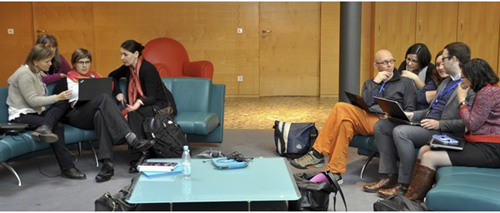The Society for Conservation Biology is a significant force helping to coordinate and strengthen the work of scientific organisations and other stakeholders at a critical international negotiation. As the fourth day of the third meeting of the Intergovernmental Platform on Biodiversity & Ecosystem Services (IPBES) concludes, that is my most powerful impression from this week's process. Granted, I am biased since I serve on SCB's delegation, but I'll let the facts speak for themselves.
 |
| Stakeholders, including SCB delegate Teuta Skorin (fourth from right), discuss strategy on Thursday. (Photo credit: Claudia Friedrich/IISD) |
As our delegation leader, Bege Jonsson, noted in a post on the Europe Section blog, much effort has been spent at this negotiation to coordinate the work of stakeholders. Stakeholders are defined in this process as, broadly, non-government participants engaged in the work of IPBES. Examples include scientific societies, indigenous peoples, individual scientists, and advocacy organisations. Since stakeholders do not have a “vote” in the process, we are most powerful when we can influence governments to accept our ideas. To do this, we have to be coordinated, knowledgeable, diplomatic, accessible to government negotiators, and willing to push them beyond what they already consider politically acceptable.
This meeting of IPBES is a critical time for stakeholders to have this influence, if it is to be as effective of an effort for biodiversity and ecosystem services as the IPCC has been for climate change. Many important decisions will be reached by the end of the meeting on Saturday 17 January. These include proposals on stakeholder engagement outside of the formal negotiations, stakeholder participation in the negotiations, the budget of IPBES through 2018, the nature and scope of several scientific assessments, policy support tools to translate scientific assessments into policy action, and a communications strategy to ensure the results of the assessments are known and understood by everyone from government decision makers to the general public.
SCB's delegation has contributed much to stakeholders' efforts to reach desired decisions in these areas, to say nothing of our work at previous IPBES sessions. As one of the larger and more experienced delegations among stakeholders, SCB members have provided leadership and capacity building to other stakeholders. As Bege mentions in his post, SCB participated in the stakeholder coordination meeting immediately before IPBES, where we contributed a variety of policy points across the IPBES proposals–ideas that in most cases became stakeholder positions. SCB delegates have chaired some daily meetings of the stakeholders, facilitating the coordination of positions and ensuring we focus on the most important issues. Our delegates have also represented stakeholders' ideas in official meetings of the session, communicating directly with government diplomats (and, importantly, being listened to!). It has become common to see SCB delegates working late into the night at the IPBES conference centre, where we have been a part of all of the key drafting sessions where stakeholders develop new proposals for governments to hopefully adopt.
Our contacts with negotiators in influential governments in this process, such as Sweden and the United States, have helped stakeholders advance their positions into the official text. Lastly, our role as capacity builders is critical for creating a stronger stakeholder community as IPBES's work continues beyond this session. Our experience in previous IPBES and other international negotiations has allowed us to help educate and train stakeholders from other organisations who are new to the process, ultimately leading to a more influential role for stakeholders, and more respect for SCB's inputs.
Much work remains in the last two days of the negotiations, and the total impact of stakeholders on the process remains to be seen. The impact of SCB, however, is already evident. For the fifth time Thursday in as many days, I have had the experience of introducing myself to another stakeholder or government negotiator, only to have them say something like, “Oh, SCB! I'm glad you're here.”